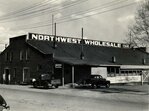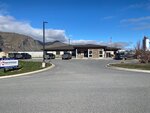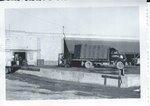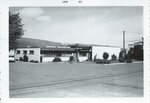





Since the 1930s, Northwest Wholesale, Inc., a locally owned agricultural cooperative, has been an impactful part of the tree fruit industry in North Central Washington.
Cooperatives of all kinds are a vital part of rural America, and agricultural co-ops are no exception as they work to maximize buying power and benefits for their members.
NWW is uniquely tailored to the tree fruit industry in North Central Washington and serves growers and packers "from bud to box."
NWW CEO Rodney Van Orman said the fruits grown in NCW include pears, cherries, and apples.
"We're pretty unique in our co-op in that we do the pre-harvest side, and we do the post-harvest side," Van Orman said. "And it's all related to tree fruit where a lot of other co-ops have other types of business activities, like retail or they do fuel products like propane, gas, diesel, petroleum products, and then some a lot of other coops in this region also work with grain growers. So essentially, we're pretty unique in the co-op world."
The co-op is headquartered in Wenatchee, with branch locations in Brewster, Cashmere, Chelan, Omak/Okanogan, Oroville, Tonasket, and Royal City.
"With those branches, we service growers in the orchard, and we call that the pre-harvest side of the business, which we have 10 PCAs or what we call field staff that will go out and go through the orchard with growers and write recommendations for crop protection, as well as nutrients for the for the trees, the orchard," he said.
"And then the other side of the business we call post-harvest," he said. "And on that side of the business, we work with the packaging warehouses, and we supply them with the consumable goods, boxes, trays, bags, and post-harvest chemicals so that the fruit can get to the market in the packaging."
In a co-op business model, members are essentially the owners.
"With the co-op model, what it does is it brings volume from the growers, which helps improve the buying power that the co-op has, so the more the members buy from the coop, the more buying power the coop has that saves the grower money," he said.
"And as a co-op, we're essentially a nonprofit, and the co-op keeps the money that it needs to pay for the operating expenses, and then whatever's leftover, it pays back the growers at the end of the year," he said. "The profitability goes back to the growers in what we call equity."
NWW offers incentive programs for members buying from the co-op. On the packaging side, they have volume incentives, so the more they buy, the more they get back. On the grower side of the business, they offer a large grower discount.
"So essentially, the growers are the owners of the co-op and buy, and then those growers are combining the volumes of the products that they're buying, which in turn helps with the buying power of the co-op with vendors and suppliers to get the best pricing and pass that on to our members," he said.
"The other benefit of the co-op is the money stays locally," he said. "So that money that's spent with the co-op stays locally with the growers, the employees, or the co-op and then also within the communities of the co-op as well."
Van Orman said a challenge the co-op faces is that as new people come into the industry or younger generations come up, they don't necessarily understand the co-op model.
Another challenge they face is that now people want savings upfront when they are buying.
"So they're looking for the best price upfront, and they want to see that versus waiting till the end of the year when they get their equity check," he said. "And then they're getting that savings back at the end of the year versus immediately. People want satisfaction now versus waiting, and that's part of the challenge of people not understanding the co-op model."
That opens an opportunity for competition to come in and look like a better deal than co-op but in the long run, the co-op is actually better if they are patient, he said.
"I think that's a challenge for all agricultural co-ops these days," he said.
NWW was started in 1937 by a group of bankers looking for ways to come out of the Great Depression and support the struggling fruit industry. The group sought to consolidate their purchasing to get better pricing for growers.
Today, the co-op has just under 300 members.
In the future, Van Orman hopes to continue to expand sales in the Wenatchee area and to expand into the Yakima market, and they are always looking at different business segments that would complement what they are doing now, he said.
Quinn Propst:509-731-3590 or quinn@ward.media.
Comments
No comments on this item Please log in to comment by clicking here